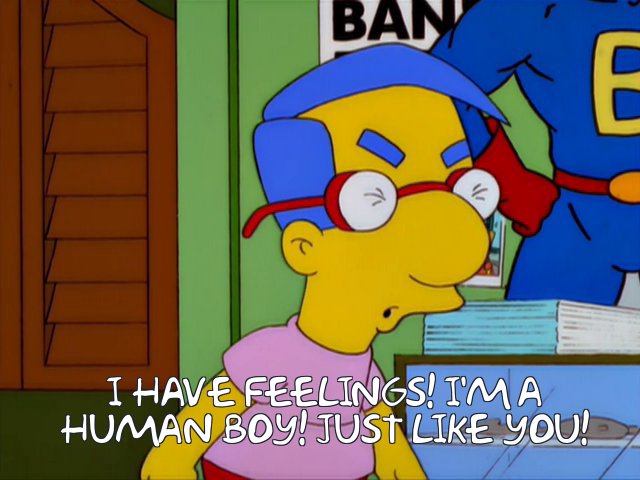MisogiKurakawa
Pin Pal
- Joined
- Nov 16, 2023
- Messages
- 553
Thing is that is that Milhouse Doesn't Live Here Anymore isn't at all about Milhouse either. As soon as it becomes about Bart and Lisa's relationship, Milhouse pretty much vanishes from any facet of the episode entirely, only showing up again late in to establish his whole deal was resolved offscreen. So instead it just kinda highlights the dichotomy which was fully in play since the Classic series: Bart and Lisa have a very complex and well-rounded relationship which forms an integral part of most of their stories (or is at least highlighted) and characterization, while Milhouse's relationship with Bart is either filled with a lot of troubling implications which the show doesn't seem like it really wants to address, or it's just a completely superficial friendship with no meaning to Bart's character whatsoever. Which kids absolutely do have....but it's not exactly compelling writing unless that's the overt point.I always liked 'Milhouse Doesn't Live Here Anymore', not only as it gives a great "What if?" story (What if Milhouse wasn't there to be Bart's friend?) and present a fun Bart-Lisa dynamic, but also as it really does show and highlight that Bart really do care for Milhouse as his friend and values him highly, disproving any notion of Bart only "caring" for Milhouse as a lackey to push around as a cohort, revealing that to Bart, Milhouse has actual meaning as a pal. And Milhouse do genuinely seem to care about Bart as a friend too and don't really mind being involved in the various shenanigans Bart pulls him into (aside from showing some hesitation at times) so he tags along for the fun of it, seemingly.
With Bart being left without a best friend (as Milhouse moved away for a while) and bonding more tightly with Lisa as a friend as opposed to just a sister, an episode like this one makes me wishes the show would be a bit more serialized, do story arcs or more two-part episode for the sake of more deeper and more effective narrative and meaningful story/character arcs.
It's curious you bring up Martin, given that, if anything, he's Bart's actually prominent peer in S2. He's got Bart Gets an F, the B-Plot in Lisa's Substitute, and Three Men and a Comic Book all prominently featuring him, while the most Milhouse gets is the single scene in Dancin' Homer and the aforementioned Three Men and a Comic Book, where he's just kinda....there, not doing much while Bart and Martin get most of the dialogue and driving action. It's not until Homer Defined when the writers try to do something with Milhouse as a character, and even then the vast majority of his characterization across S3 shows him in a lot more "normal" a light compared to subsequent seasons.Well part of his troubles are possibly because sidekicks are a cursed role. They're kinda always stuck being an extra pair of hands or someone to explain things to unless they're second to an antagonist or villain. To that extent, he doesn't really contrast a lot with Bart (not in a way that opens up or leads to stories, anyway) and doesn't have any unique skills, and probably couldn't feasibly have any that wouldn't just make him a lesser Martin.
I think all of this comes back to Bart's Friend Falls in Love and specifically its ending. Because the episode more or less leaves the show on a complete blank concerning the Bart/Milhouse dynamic - Bart does something pretty horrible to Milhouse for believable but overall inexcusable reasons, initially shows zero guilt until it becomes clear Milhouse won't play with him even with Samantha gone, and then....the episode basically works backwards to make it so that Bart doesn't have to genuinely face repercussions for his actions. He apologizes to Samantha for what he did, only for this to be dismissed literally seconds later by Samantha saying she likes St Sebastian's and doesn't want to leave (which has a lot of very uncomfortable implications, considering that her father is implied to be an abusive control freak). Bart essentially gets off with exactly what he wanted out of the affair, while Milhouse loses the girl who genuinely liked him and is stuck with his toxic friendship with Bart. There's basically no message here, and that I think really dramatically effected the development of the character when you compare how the likes of Moe and Edna were developed in their respective spotlight stories that season.









